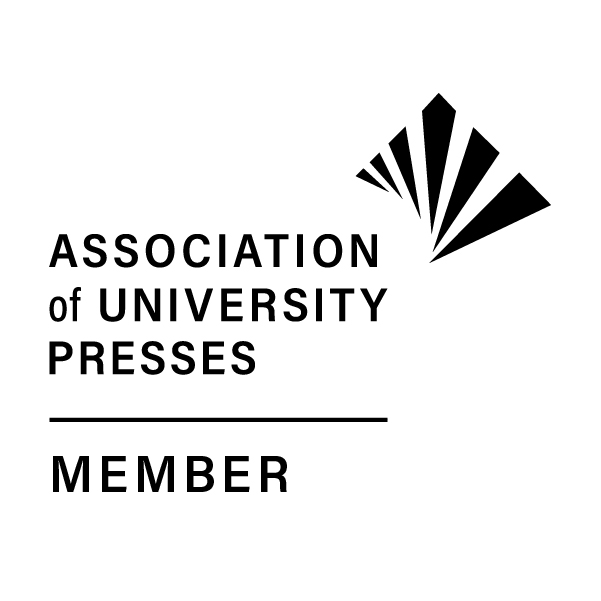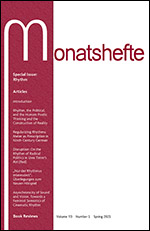|


|

Subscribe
Read the Journal Online
Submission Guidelines
Editorial Board
Receive Email Updates
Advertise in Monatshefte
Indexes/Abstracts
Current Issue TOC
Back Issues TOC
Monatshefte 2022 Subscription Rates
Institutions:
print & online $271
online only $233
Individuals:
print & online $103
online only $86
Non U.S. Postage (no postage charges for online-only subscriptions)
Airmail: add $40/yr.
Canadian Subscribers: add 5% GST. |
Monatshefte
Volume 100, Number 4, Winter 2008 Table of Contents
Articles
Eckart Goebel
Aussöhnung. Sublimierung als Paradigma in Goethes Trilogie der Leidenschaft
Abstract:
The essay offers close readings of three poems Goethe published in 1827 as the Trilogy of Passion. As works of art these poems are examples for what Freud later described as sublimation. Goethe’s arrangement confirms this perspective, as the trajectory leads from despair, An Werther, via grief, Elegie, to atonement, Aussöhnung. On the other hand, as the essay argues, the three poems describe Goethe’s life itself as a trilogy of passion, marked by the turning points of the novel Werther, the drama Torquato Tasso, and the Trilogy itself. In his autobiography, Goethe calls poetry the “secular gospel.” The gospel includes the passion, culminating in the resurrection, the epitome of sublimation. Goethe’s life turns out to be haunted by the taedium vitae, and secular sublimation does not refer to the suffering subject but to its beautiful products only. The sublime works of poetry therefore protest against a reality principle requiring resignation, and sublimation: The gift of poetry enables the poet to say what he suffers, but does not end his suffering. (EG; in German)
Robert McFarland
Reading “Das öde Haus”: E.T.A. Hoffmann’s Urban Hermeneutics
Abstract:
In a story titled “Das öde Haus” from his 1817 collection Nachtstücke, E.T.A. Hoffmann (1776–1822) creates a hermeneutic problem in the streets of Berlin. No matter how hard the story’s protagonist tries to use his powers of observation and his imagination to solve the mystery behind the façade of a dilapidated old house, he is repeatedly frustrated. This article connects “Das öde Haus” to early nineteenth-century aesthetic discourses about hermeneutics, vision and the developing modern urban landscape. While engaging elements of Enlightenment and Romantic hermeneutic traditions, Hoffmann’s story ultimately points toward a more modern exegesis based upon the aesthetic value of incomprehensibility. (RM)
Amanda Norton
The One Who “Taught Us How to Live on This Real Earth, without Any Conditions but Those of Life”: Tracing the Influence of Michel de Montaigne on Erich Auerbach and Mimesis
Abstract:
Mimesis (1946), Erich Auerbach’s seminal work of literary criticism, has provided scholars and laymen alike with a captivating, informative survey of representation in the Western literary tradition for more than a half a century. This article traces the influence of the essayist Michel de Montaigne (1533–1592) on Auerbach’s writing, both in Mimesis and throughout his career. Auerbach’s admiration for Montaigne’s style appears in many guises, from his own confident tone to his insistence upon the engagement of his ideal reader. By seeking to understand and illuminate one of Erich Auerbach’s intellectual and stylistic influences, this article will enhance the reader’s understanding of his critical methods and aims. (AN)
Sandra Alfers
Voices from a Haunting Past: Ghosts, Memory, and Poetry in Ruth Klüger’s weiter leben. Eine Jugend (1992)
Abstract:
This article focuses on the poetry Ruth Klüger wrote after 1945 and included in her highly acclaimed autobiography weiter leben. Eine Jugend (1992). The article focuses on the poems’ function within the text and offers a reading of weiter leben as haunted. Klüger’s autobiography echoes with the voices of the dead, particularly the ghosts of her brother and father who were murdered during the Holocaust, and also those of the living. Her poems constitute the initial textual anchors from which the writing of traumatic loss and the recollection of her agonizing past proceed. By reflecting and commenting on the relationship between the dead and the living, memory and history, poetry and autobiography, Klüger locates weiter leben at the intersection of debates about the appropriate narrative form of Holocaust history. (SA)
Review Articles
Sabine Gross
Surveying Narratology
Book Reviews
Bahr, Ehrhard, Weimar on the Pacific: German Exile Culture in Los Angeles and the Crisis of Modernism (Wulf Koepke)
Bogdal, Klaus-Michael, Klaus Holz und Matthias Lorenz, Hrsg., Literarischer Antisemitismus nach Auschwitz (Joanne Sayner)
Bursch, Roland, “Wir dichten die Geschichte.” Adaption und Konstruktion von Historie bei Friedrich Dürrenmatt (Richard R. Ruppel)
Clarke, David und Arne De Winde, Hrsg., Reinhard Jirgl. Perspektiven, Lesarten, Kontexte (Keith Bullivant)
Classen, Albrecht, ed., Old Age in the Middle Ages and the Renaissance (Robert G. Sullivan)
Drügh, Heinz, Ästhetik der Beschreibung. Poetische und kulturelle Energie deskriptiver Texte (1700–2000) (Rüdiger Singer)
Hall, Katharina, Günter Grass’s ‘Danzig Quintet:’ Explorations in the Memory and History of the Nazi Era from Die Blechtrommel to Im Krebsgang (Thomas W. Kniesche)
Häntzschel, Hiltrud, Marieluise Fleißer. Eine Biographie (Stacy Jeffries)
Kraft, Helga W. and Dagmar C.G. Lorenz, eds., From Fin-de-Siècle to Theresienstadt: The Works and Life of the Writer Elsa Porges-Bernstein (Cathy Gelbin)
Lennox, Sara, Cemetery of the Murdered Daughters: Feminism, History, and Ingeborg Bachmann (Katrin Kohl)
Levin, David J., Unsettling Opera: Staging Mozart, Verdi, Wagner, and Zemlinsky (Brian Hyer)
Murphy, G. Ronald, Gemstone of Paradise: The Holy Grail in Wolfram’s Parzival (Stephen Mark Carey)
Nader, Andrés, Traumatic Verses: On Poetry in German from the Concentration Camps, 1933–1945 (Frederick A. Lubich)
Pizer, John, The Idea of World Literature: History and Pedagogical Practice (B. Venkat Mani)
Schmitz, Helmut, ed., A Nation of Victims? Representations of German Wartime Suffering from 1945 to the Present (Maria Siguan)
Stephan, Alexander, Überwacht—Ausgebürgert—Exiliert. Schriftsteller und der Staat (Johannes F. Evelein)
Trageser, Martin, Es liegt in der Luft eine Sachlichkeit. Die Zwanziger Jahre im Spiegel des Werks von Marcellus Schiffer (1892–1932) (Alan Lareau)
Uther, Hans-Jörg, Handbuch zu den “Kinder- und Hausmärchen” der Brüder Grimm. Entstehung—Wirkung—Interpretation (Jack Zipes)
Wagner, Frank D., Antike Mythen. Kafka und Brecht (Franz R. Kempf)
Winnen, Angelika, Kafka-Rezeption in der Literatur der DDR. Produktive Lektüren von Anna Seghers, Klaus Schlesinger, Gert Neumann und Wolfgang Hilbig (Marcel Rotter)
Index Volume 100 (2008)
|


